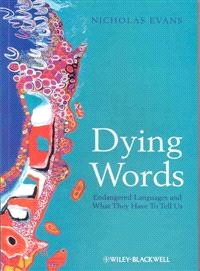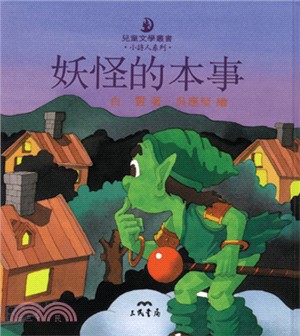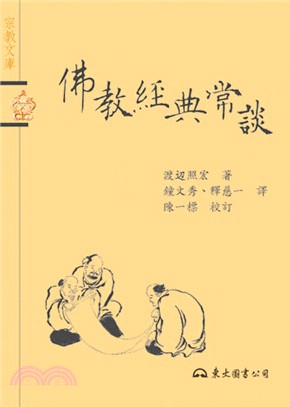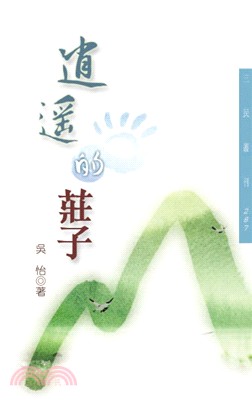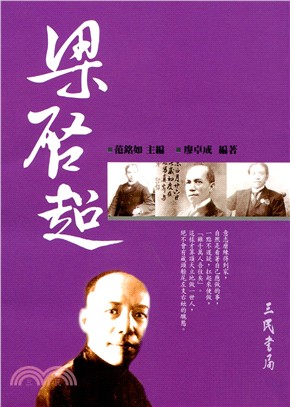Dying Words - Endangered Languages And What They Have To Tell Us
- 系列名:Language Library
- ISBN13:9780631233060
- 出版社:John Wiley & Sons Inc
- 作者:Evans
- 裝訂/頁數:平裝/320頁
- 規格:24.8cm*17.1cm*1.9cm (高/寬/厚)
- 出版日:2009/04/09
相關商品
商品簡介
作者簡介
名人/編輯推薦
目次
商品簡介
The next century will see more than half of the world’s 6,000 languages become extinct, and most of these will disappear without being adequately recorded. Written by one of the leading figures in language documentation, this fascinating book explores what humanity stands to lose as a result.
Explores the unique philosophy, knowledge, and cultural assumptions of languages, and their impact on our collective intellectual heritage
Questions why such linguistic diversity exists in the first place, and how can we can best respond to the challenge of recording and documenting these fragile oral traditions while they are still with us
Written by one of the leading figures in language documentation, and draws on a wealth of vivid examples from his own field experience
Brings conceptual issues vividly to life by weaving in portraits of individual ‘last speakers’ and anecdotes about linguists and their discoveries
Explores the unique philosophy, knowledge, and cultural assumptions of languages, and their impact on our collective intellectual heritage
Questions why such linguistic diversity exists in the first place, and how can we can best respond to the challenge of recording and documenting these fragile oral traditions while they are still with us
Written by one of the leading figures in language documentation, and draws on a wealth of vivid examples from his own field experience
Brings conceptual issues vividly to life by weaving in portraits of individual ‘last speakers’ and anecdotes about linguists and their discoveries
作者簡介
Nicholas Evans is Professor of Linguistics at the Australian National University and a fellow of the Australian Academy of the Humanities. He is on the editorial boards of the journals Linguistic Typology and Australian Journal of Linguistics, and on the Scientific Advisory Board of the Max Planck Institute for Psycholinguistics in Nijmegen. He is the author of a number of books, including Bininj Gun-wok (2 volumes, 2001), Archaeology and Linguistics: Aboriginal Australia in Global Perspective (co-edited with Patrick McConvell, 1998), and A Grammar of Kayardild (1992).
名人/編輯推薦
"In sum, this is the best book I've yet seen in terms of its potential to persuade the broader public of the need to value endangered languages and to support the fight to keep them in daily use. Will Dying words convince my recalcitrant friends? I don't know, but I will urge them to try it." (Language Documentation and Conservation, 2010)
"In sum, this is the best book I've yet seen in terms of its potential to persuade the broader public of the need to value endangered languages and to support the fight to keep them in daily use." (Language Documentation and Conservation, October 2010)"The style of this book is at a level that both interested laypersons and undergraduate students of linguistics can understand - and indeed be inspired by - without excessive pondering. But its content is so important, so beneficial - and hitherto, so distinctive among works of general linguistics - that it should be put into the hands of most, if not all, graduate students in this field. It is supported with good bibliographies which will generate further interest in its readers through the examples it discusses. With luck, it will encourage them to go out and do likewise." (International Journal of Applied Linguistics, Spring 2010)
"Of all the books on language disappearance that have appeared in the last decade, Dying Words is intellectually the most challenging and the most persuasive. Evans sets out to show why linguistic diversity is an essential part of what makes us human … .Modestly yet persuasively, Evans has thrown down an intellectual guantlet." (Times Literary Supplement, May 2010)
"I predict that Dying Words will be an important addition to the fields of linguistics and cultural anthropology.... Evans maintains a style which is thought-provoking without being overbearing. I found the experience of reading Dying Words to be an exciting one." (Journal of Folklore Research, January 2010)
"Nicholas Evans ... has written a sensitive and deeply persuasive book about what endangered languages can tell us. He gives us a huge mosaic of the dwindling storehouse of human discovery that is our languages. That's why we should care." (Courier Mail, August 2009)
"Dying Words ... is an astonishing book. This is a study of dying languages, of tremendous variety and richness. It makes clear ... the importance of describing each language and each culture on its own terms ... .I recommend this book to any person with an enquiring mind, prepared to be astonished by the variety of languages, living and dead, which enrich our world." (Teacher Magazine, September 2009)
"Evans has made an outstanding contribution toward increasing awareness of endangered languages with this book, and it deserves to be one of the go-to books on the topic." (Linguist List, August 2009)
"Evans describes the dimensions of the loss, culled from his years of work in northern Australian Aboriginal communities, in the recently released Dying Words: Endangered Languages and What They Have to Tell Us." (The Australian, June 2009)
"While some linguists worry that helping communities shore up their languages saps too much time from research, Evans believes that linguists who document languages in the field should take an active role in such activities." (The Chronicle of Higher Education, May 2009)
"Nicholas Evans manages to conquer the mammoth task of sharing the plight of the endangered languages of the world in a manner that very few have been able to do. Intertwining anecdote and narrative with concepts of linguistics, Evans touches upon the need for awareness about the plight of the world's languages without unnecessary dramatics." (Endangered Languages, April 2009)
"A fascinating and colourful view of what we are losing as languages die, by a linguist who understands the significance of our loss more deeply than most."
–Greville G. Corbett, University of Surrey
"Nick Evans’ book is an elegant, eloquently rendered narrative of the human story as revealed through our languages. With deep erudition in world literatures both oral and written, he captures the interplay between speaker and tradition, word and thought, language and land; and he shares with his readers the intellectual life of speakers and humanist-scientists seeking to preserve and document this heritage."
–Tony Woodbury, University of Texas at Austin
"In sum, this is the best book I've yet seen in terms of its potential to persuade the broader public of the need to value endangered languages and to support the fight to keep them in daily use." (Language Documentation and Conservation, October 2010)"The style of this book is at a level that both interested laypersons and undergraduate students of linguistics can understand - and indeed be inspired by - without excessive pondering. But its content is so important, so beneficial - and hitherto, so distinctive among works of general linguistics - that it should be put into the hands of most, if not all, graduate students in this field. It is supported with good bibliographies which will generate further interest in its readers through the examples it discusses. With luck, it will encourage them to go out and do likewise." (International Journal of Applied Linguistics, Spring 2010)
"Of all the books on language disappearance that have appeared in the last decade, Dying Words is intellectually the most challenging and the most persuasive. Evans sets out to show why linguistic diversity is an essential part of what makes us human … .Modestly yet persuasively, Evans has thrown down an intellectual guantlet." (Times Literary Supplement, May 2010)
"I predict that Dying Words will be an important addition to the fields of linguistics and cultural anthropology.... Evans maintains a style which is thought-provoking without being overbearing. I found the experience of reading Dying Words to be an exciting one." (Journal of Folklore Research, January 2010)
"Nicholas Evans ... has written a sensitive and deeply persuasive book about what endangered languages can tell us. He gives us a huge mosaic of the dwindling storehouse of human discovery that is our languages. That's why we should care." (Courier Mail, August 2009)
"Dying Words ... is an astonishing book. This is a study of dying languages, of tremendous variety and richness. It makes clear ... the importance of describing each language and each culture on its own terms ... .I recommend this book to any person with an enquiring mind, prepared to be astonished by the variety of languages, living and dead, which enrich our world." (Teacher Magazine, September 2009)
"Evans has made an outstanding contribution toward increasing awareness of endangered languages with this book, and it deserves to be one of the go-to books on the topic." (Linguist List, August 2009)
"Evans describes the dimensions of the loss, culled from his years of work in northern Australian Aboriginal communities, in the recently released Dying Words: Endangered Languages and What They Have to Tell Us." (The Australian, June 2009)
"While some linguists worry that helping communities shore up their languages saps too much time from research, Evans believes that linguists who document languages in the field should take an active role in such activities." (The Chronicle of Higher Education, May 2009)
"Nicholas Evans manages to conquer the mammoth task of sharing the plight of the endangered languages of the world in a manner that very few have been able to do. Intertwining anecdote and narrative with concepts of linguistics, Evans touches upon the need for awareness about the plight of the world's languages without unnecessary dramatics." (Endangered Languages, April 2009)
"A fascinating and colourful view of what we are losing as languages die, by a linguist who understands the significance of our loss more deeply than most."
–Greville G. Corbett, University of Surrey
"Nick Evans’ book is an elegant, eloquently rendered narrative of the human story as revealed through our languages. With deep erudition in world literatures both oral and written, he captures the interplay between speaker and tradition, word and thought, language and land; and he shares with his readers the intellectual life of speakers and humanist-scientists seeking to preserve and document this heritage."
–Tony Woodbury, University of Texas at Austin
目次
Acknowledgments.
Prologue.
A Note on the Presentation of Linguistic Material.
Part I: The Library of Babel.
1. Warramurrungunji’s Children.
2. Four Millennia to Tune In.
Part II: A Great Feast of Languages.
3. A Galapagos of Tongues.
4. Your Mind in Mine: Social Cognition in Grammar.
Part III: Faint Tracks in an Ancient Wordscape: Languages and Deep World History.
5. Sprung from Some Common Source.
6. Travels in the Logosphere: Hooking Ancient Words onto Ancient Worlds.
7. Keys to Decipherment: How Living Languages Can Unlock Forgotten Scripts.
Part IV: Ratchetting Each Other Up: The Coevolution of Language, Culture, and Thought.
8. Trellises of the Mind: How Language Trains Thought.
9. What Verse and Verbal Art Can Weave.
Part V: Listening While We Can.
10. Renewing the Word.
Epilogue: Sitting in the Dust, Standing in the Sky.
Notes.
References.
Index of Language Names.
General Index.
Prologue.
A Note on the Presentation of Linguistic Material.
Part I: The Library of Babel.
1. Warramurrungunji’s Children.
2. Four Millennia to Tune In.
Part II: A Great Feast of Languages.
3. A Galapagos of Tongues.
4. Your Mind in Mine: Social Cognition in Grammar.
Part III: Faint Tracks in an Ancient Wordscape: Languages and Deep World History.
5. Sprung from Some Common Source.
6. Travels in the Logosphere: Hooking Ancient Words onto Ancient Worlds.
7. Keys to Decipherment: How Living Languages Can Unlock Forgotten Scripts.
Part IV: Ratchetting Each Other Up: The Coevolution of Language, Culture, and Thought.
8. Trellises of the Mind: How Language Trains Thought.
9. What Verse and Verbal Art Can Weave.
Part V: Listening While We Can.
10. Renewing the Word.
Epilogue: Sitting in the Dust, Standing in the Sky.
Notes.
References.
Index of Language Names.
General Index.
主題書展
更多主題書展
更多書展本週66折
您曾經瀏覽過的商品
購物須知
外文書商品之書封,為出版社提供之樣本。實際出貨商品,以出版社所提供之現有版本為主。部份書籍,因出版社供應狀況特殊,匯率將依實際狀況做調整。
無庫存之商品,在您完成訂單程序之後,將以空運的方式為你下單調貨。為了縮短等待的時間,建議您將外文書與其他商品分開下單,以獲得最快的取貨速度,平均調貨時間為1~2個月。
為了保護您的權益,「三民網路書店」提供會員七日商品鑑賞期(收到商品為起始日)。
若要辦理退貨,請在商品鑑賞期內寄回,且商品必須是全新狀態與完整包裝(商品、附件、發票、隨貨贈品等)否則恕不接受退貨。




